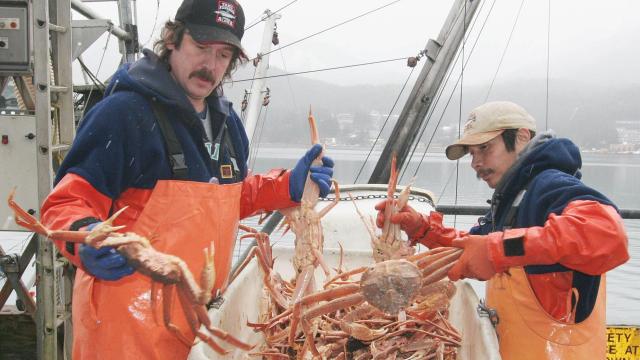Snow crab fishing season in Alaska’s Bering Sea has been cancelled for the first time in history. Bristol Bay’s red king crab fishery will also be closed, for the second year in a row. Both decisions follow shellfish surveys that revealed startling population collapses.
Between 2019 and 2021, snow crab numbers in the Bering Sea fell by about 90%. 2022 counts have dropped even further, said Miranda Westphal, a state Department of Fish and Game (ADF&G) biologist, to Alaska Public Media. “In 2021 when they surveyed, we saw the largest decline we’ve ever seen in the snow crab population, which was very startling, I think, for everyone,” Westphal told the outlet.
“Management of Bering Sea snow crab must now focus on conservation and rebuilding given the condition of the stock,” said the ADF&G in its announcement. “Efforts to advance our science and understanding of crab population dynamics are underway.”
The state’s crab fishing industry, dramatized in Discovery Channel’s Deadliest Catch, is floundering as a result. “People are really going to have to make some hard calls here, whether that’s…selling their vessels [or] looking for other opportunities in other fishing sectors which is few and far between,” one fisherman, Gabriel Prout, told Alaska Public Media. “Fishermen are really going to be hurting the next year,” he added.
Another fisher, Dean Gribble Sr., told NBC News that the cancelled season would be “life-changing, if not career-ending for people.” In 2020, NOAA valued Alaska’s snow crab harvest at more than $US101.7 ($141) million. This year, it will be $0.00.
The exact cause of the crab crash is currently unknown, and the state is investigating it. But Westphal and others think climate change is likely to blame. The Bering Sea has endured record-breaking, massive marine heat waves in recent years, with a particularly catastrophic one known as “the blob” occurring between 2014-2016.
Though that event passed, parts of the Bering Sea spent more than half the time between September 2018 and January 2021, under some level of officially recognised, anomalous heatwave, according to a 2021 NOAA report. And, even when heatwaves weren’t occurring, ocean temperatures in the region remained just below the heatwave threshold, and significantly above average.
Snow crabs and other sea life native to the waters around Alaska are adapted to icy cold temperatures. When the heat rises, they can’t cope. One of the biggest issues is deoxygenation. Warmer water simultaneously holds less oxygen and leads to animals needing more oxygen, because of increased metabolic demand. Further, warm water is more buoyant and less prone to mixing, which can lead to stratification of gases and nutrients in the water column, further exacerbating the problem.
Climate change is also known to drive marine wildlife disease outbreaks. For instance, the sea star wasting illness that’s led to calamitous Pacific Coast starfish losses has been linked to ocean warming. Another ADF&G scientist, Ben Daly, told CBS News that infection or sickness could be a possible culprit behind the recent snow crab disappearance.
Alaska is the fastest warming state, as polar regions are heating up quicker under climate change than elsewhere.
